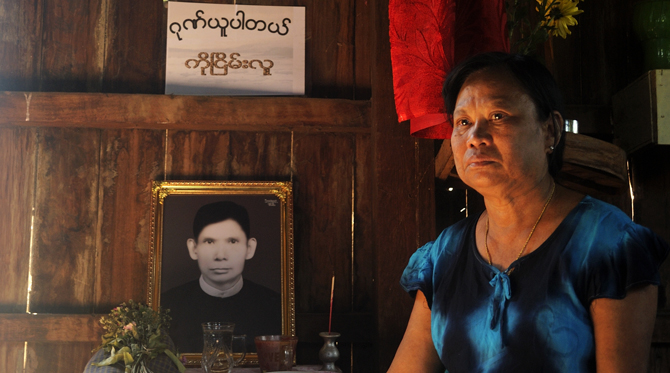Dying Behind Bars

Because of his declining health and acts of defiance towards the prison authorities, he was confined to a cell in a special ward of the Insein Prison hospital until his release. The ward was used for inmates suffering from everything from mental illness to communicable diseases such as leprosy, according to a friend who used to spend some time with Thet Nwe in the prison.
Burmese prisons rarely send inmates, especially political prisoners, to outside hospitals because prison authorities think it would damage their prison's image. Only when the prison doctor is completely unable to provide treatment because of a lack of medical equipment inside the prison will the authorities reluctantly send an inmate to a proper hospital, according to Han Win Aung, a former political prisoner who spent three months in a prison hospital receiving treatment for tuberculosis.
“If an inmate was allowed to see a doctor outside, it was taken for granted that he was going to die, because it was already too late for him to be cured,” he added.
Burmese prisons are infamous for their poor health care systems. Insein Prison, one of the biggest in the country with thousands of inmates, has only one understaffed 50-bed hospital.
“If there's an emergency case, doctors never arrive in time. They always take at least an hour,” said a former political prisoner in his thirties who was discharged from Insein Prison in January.
“There are only three or four doctors for the whole prison, so they ask some prisoners to act as their assistants, without ever giving them proper training,” said Han Win Aung, who recalled being scared to death when an HIV-positive inmate was preparing to give him an injection for his tuberculosis.
“I asked another prisoner to do it for me,” he said. “I received 92 TB shots over three months, but never from the doctor's assistant with HIV.”
Sometimes the number of patients in the 50-bed hospital rose to 10 times its capacity, said one 35-year-old former political prisoner.
“Everything was in a chaos. Patients were lying on the concrete floor. Doctors were nowhere to be seen. I saw 12 people die in a single week,” he said.
Some other prisons in the country have no hospital at all, so inmates have to rely on “clinics” stocked with little more than over-the-counter painkillers like paracetamol and mild sedatives like “Burmeton” (Chlorphenamine).
“Some of the tablets were so old that they were covered with mold,” said Arkar Boh, who was released from Kyaukphyu Prison in Arakan State last October.
“I used to stay in a cramped cell together with inmates infected with TB and HIV,” said Ye Thu Ko, 27, who was released from Pegu Prison a few months ago, explaining why he was standing in the reception area of Thukha Charity Clinic in northern Rangoon holding a chest x-ray.
“The doctor has just told me that I have hepatitis C. I've heard there's no cure for it. I have to say it's a gift from Insein,” said Saw Maung, 31, a former political prisoner released from Insein Prison on Jan. 13.
According to Dr Ohn Myint, a physician who has been treating ex-political prisoners at the clinic for the past three years, liver dysfunction is one of the most common ailments afflicting former inmates of Burma's prison system.
“Most of the people coming here also have tuberculosis. Others have infectious diseases like scabies,” he said. “Medical care in prisons is so poor that it's no wonder people come out with those diseases.”
Spending years behind bars can also take a toll on prisoners' mental health.
“Now I hate padlocks,” said Ye Khaung, 34, of Generation Wave, who was detained for three years in Thayat Prison, 545 kilometers north of Rangoon. “When I wake up, I have to force myself to open my eyes, because I'm always afraid that when I open them, I will find myself back in prison. I can never shake this subconscious feeling of insecurity.”
“I'm frightened whenever I hear a door slam, because it's a sound I heard every time they locked us up in our cells,” said Ye Thu Ko.
In Burma, a jailer has absolute power over every aspect of a prison life.
“The warden is like a god in prison. You can't do anything without his approval,” said Arkar Boh, who recalled seeing how a good-natured prison doctor's efforts to help sick prisoners were frustrated by an uncooperative prison warden.
But perhaps there is a flicker of light at the end of the tunnel.
“All I can say is that I'm trying to upgrade the prisoners' welfare and health care system. While the government is on the road to reform, I feel obliged to do what I can within my capacity,” said the warden of a prison in western Burma, speaking on condition of anonymity because he was not authorized to discuss the issue of prison reforms.
Had Thet Nwe been detained in prison where the welfare of inmates mattered, his fate might have been very different.
« previous 1 | 2 | 3 next page »
|
||
|
||
|
||
|
||
|
||
|
||
|
||
|
||
|
||
|
||
- Students Without a University
- Displaced and Distressed
- Training the Next Generation of Kachin Rebels
- Rangoon Art Show Provides Arresting Display
- Magical Mandalay Still Holds Court for Tourists
- Distrust and Displacement on Kachin Frontline
- Thein Sein: Reformist or Caretaker?
- School’s Not Out in Kachin State
- Irrawaddy Dolphins are Firm Fisherman’s Friends
- Thein Sein: Reformist or Caretaker?
